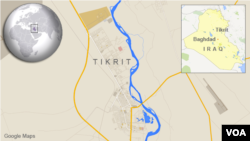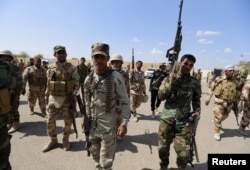Islamic State’s brazen overnight attack on Tikrit, killing at least 31 security personnel and civilians, is part of a series of diversionary attacks designed to mask its mounting losses in Mosul and portray that it has strength elsewhere in Iraq, analysts say.
“IS might carry these attacks everywhere in Iraq,” said Michael Knights of the Washington Institute for Near East Policy, a research institution.
Eighteen Iraqi police officers were among the dead in a series of coordinated strikes claimed by Islamic State (IS) late Tuesday and into Wednesday.
Disguised as police
Authorities say the attackers disguised themselves in police uniforms and drove police cars to gain access to the city – once a Baathist stronghold of former Iraqi leader Saddam Hussein.
The militants stormed the residence of the city’s police colonel, killing him and several members of his family, according to reports.
Two of the suicide bombers killed themselves, exploding the munitions in their vests after they ran out of firepower, according to officials. Five attackers were killed in clashes with Iraqi security forces.
"Attacking police is IS '101,'" analyst Knights said, referring to a term used to describe introductory learning. “They [authorities] are the face of the government, they collect intelligence from the locals, and they are a soft target."
Mosul offensive
Tikrit is 220 kilometers south of Mosul, where the U.S.-led coalition has been pounding IS forces and driving them from the city and its environs.
U.S. officials have said that while IS remains dangerous, its fighting force in Iraq and Syria has been whittled down to about 12,000 to 15,000 fighters, while the amount of territory the group controls has shrunk by about 65 percent.
U.S. and Iraqi officials have been concerned that as IS gets routed from its northern Iraq stronghold it will regroup in smaller numbers and conduct terror attacks elsewhere in the country.
"IS will not be eradicated from Iraq by a military operation," Iraq's Kurdistan Regional Government Prime Minister Nechirvan Barzani said recently in an interview with VOA. "It may well lose cities like Mosul and [Syria's] Raqqa, but it will remain as an ideology and organization."
IS took control of Tikrit in 2014 after fierce battles with Iraqi forces that later regained command of the city in 2015. While analysts say it is doubtful IS can regain control of Tikrit, militants likely will continue to try to undermine authority with surprise attacks from small rural bases.
"Tikrit is vulnerable, as many areas that surround it have training camps that belong to IS," Omar Al Nadawi, an Iraqi affair analyst, told VOA. "IS will focus on weak areas and cities in order to take the attention away from Mosul."
IS still viable in areas
As coalition backed forces focus on Mosul, comprehensive rooting of IS has yet to begin. There are areas in Iraq and Syria, along both the border and in the Euphrates River Valley, where IS still has considerable freedom of movement and influence.
"There is a lot of fighting left to go," the chairman of the Joint Chiefs, U.S. Marine Corps General Joseph Dunford, said after a visit to Iraq this week.
Michael Pregent, a former intelligence officer now with the Hudson Institute in Washington, said is adopting an al-Qaida model "where they don't plant flags, they don't say they own this neighborhood, they don't say they own this town. But they're able to conduct terrorist operations out of them - car bombs, assassinations, start recruiting, start intimidating the reconciliation process."
Referring to Tikrit, he said: "When they can use police cars and uniforms and stage an attack in the heart of the first city taken from them means that the Iraqi forces should look over their shoulders to see what they did. It shows that the security breach is still a big thing and very vulnerable.
"If Mosul falls, it is a great win, but the story with IS is not over," Pregent said. "IS is not going to be eradicated by the loss of their territory. It will find hideouts as long as the Sunni population feels oppressed and does not share the power cake of the country."





